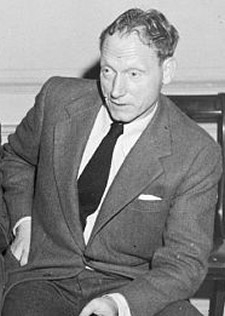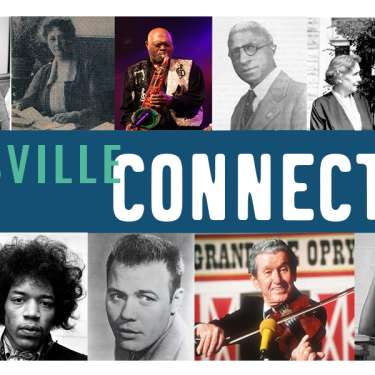Robert Penn Warren
 U.S. Poet Laureate
U.S. Poet Laureate
1905-1989
by: Arian Finley
"I believe in the glories of our past; in the honors of our present; in the brilliancy of our future.” (Clarksville High School Senior Creed, R.P.W.)
Born in Guthrie, Kentucky and the nation’s first officially titled Poet Laureate in 1986, Robert Penn Warren was an accomplished writer, the only one to receive a Pulitzer Prize in both poetry and fiction among numerous achievements. But many years before that, Warren came to Clarksville in 1920 with one goal in mind: to join the Naval Academy. Between the time the original Clarksville High School was built in 1906 and its renovation into an apartment complex in 1982, he would attend the school for a less than a year before he graduated with highest honors at 16. Despite his short attendance, the renovated apartments would proudly take on this former student’s name in 2010 as the Penn Warren Apartments.
Warren had every intention of joining the Naval Academy upon his graduation. However, in 1921 he was left blinded by his brother, who accidentally threw coal at him.
This prevented Warren from passing his Navy physicals, ending his militaristic path. Instead, he attended Vanderbilt University intending to study chemical engineering, where he would meet Allen Tate, his roommate, and John Crowe Ransom, his teacher, both of which had a major impact on his desire to write, as inspiration and future fellow members of The Fugitives, a group on intellects that gathered to discuss and write literature. Allen Tate, who would be revered as a future Poet Laureate in 1943, and Warren seemed as close as brothers both during and after their time at Vanderbilt, with the pair continuing to remain in close contact through letters. In 1925, Warren graduated Vanderbilt. His next chapter would be at the University of California for graduate school, where he worked as a teacher’s assistant.
Warren would meet his future wife, Emma “Cinina” Brescia, at the University of California, despite her previous engagement which resulted in a messy breakup. He next attended Yale on fellowship, before continuing on to New College at Oxford for his B. Litt, which would show its influences in his writing. Because the Rhodes Fellowship that allowed Warren to attend Oxford would be taken away under marriage, he married Brescia in secret, even from Allen Tate, in 1929. Allen Tate and especially his wife, Caroline Gordon, would never seem to take kindly to her.
In 1930, Warren took his first teaching job at the relocated Southwestern College in Memphis, which he had known as Southwestern Presbyterian University in Clarksville. Here, he established himself as an charismatic and enthusiastic scholar, who would still always create time for his writing. After his mother died in 1931, Warren returned to Vanderbilt University to take over former mentor and coveted friend John Crowe Ransom’s position. While Warren craved life and retirement in Middle Tennessee, this dream came to an end when he was let go from Vanderbilt. He was offered a job at LSU, where he helped found The Southern Review. Warren would go on to teach at the University of Minnesota and Yale University in later years.
Even as a scholar, writing remained at the forefront of Warren’s life, and his dedication earned him much prestige. In 1944, he was elected as the U.S. Consultant in Poetry, a position which he was again elected for in 1986, when it was officially renamed United States Poet Laureate. One of his novels, All the King’s Men, was turned into a movie, and was the first of three Pulitzer Prizes.
As Warren’s reputation increased, so did the strain on his marriage with Cinina, and the pair consequently divorced. Not long after, in 1952, Warren married fellow writer Eleanor Clark, who soon gave birth to his first daughter, Rosanna Phelps Warren. Just after Warren’s father died of Prostate Cancer, their son, Gabriel Penn Warren, was born.
Now happier than ever with his new family, literature and writing continued to dominate Warren’s life until his death. In 1985 he was diagnosed with Prostate Cancer, which finally took his life in 1989. Warren is remembered as a charismatic individual who made an incredible impact on the creative writing community, as well as literature.
Photo Credits: Library of Congress


